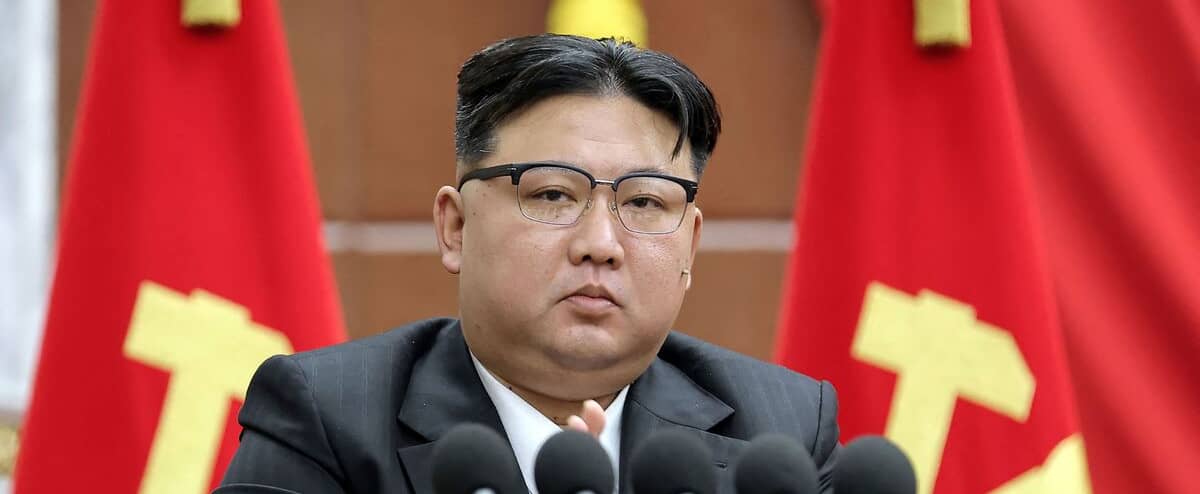North Korean leader Kim Jong Un declared South Korea his “main enemy,” dissolved the authorities responsible for reunification and threatened war over any territorial violations, “even 0.001 mm.”
• Also read: North Korea says it has tested “undersea nuclear weapons system.”
But is this fiery rhetoric a sign of real change?
Here's what we know:
What is the situation?
After years of deteriorating relations, Pyongyang formalized its position in mid-January with a threat to “annihilate” the South in the event of war.
This is an important change because “in the past, when there was a threat of armed conflict, there was an escape route to maintain control, but now there is none at all,” notes Hong Min, an analyst at Korea National Institute Association in Seoul.
North Korea has abolished “every inter-Korean mechanism designed to prevent conflicts from spiraling out of control,” he adds.
According to him, “The fact that the North calls the South the main enemy is not just rhetoric: words could become actions.”
Invasion of South Korea?
The North Korean leader reiterated that he would not “unilaterally” trigger a conflict, but that he also had “no intention of avoiding war.”
He said he no longer recognized the de facto maritime border between the two Koreas, the so-called Northern Limit Line (NLL), and that the North Korean military had recently held live artillery exercises in the region.
This has created “an increasing possibility of a military engagement between the two sides, which could lead to a larger conflict,” Hong said.
In addition, Pyongyang has moved closer to Moscow, including – according to Washington and Seoul – by supplying missiles used in its recent major attacks on Ukraine in return for help for its satellite program.
Seoul, in turn, has threatened to respond “much harsher” to any provocation, an aggressive approach that is not without risks, as highlighted in an editorial in the Hankyoreh newspaper this week.
“As North Korea becomes more and more reckless, we hope the government will focus its efforts on dealing with this situation,” the newspaper added.
What is the next step ?
According to Choi Gi-il, a professor of military science at Sangji University, the two Koreas now have the “highest probability of becoming involved in an armed conflict.”
“Suppose a future provocation from the North causes civilian and military casualties. With mussels we target the place of origin. But will we also hit them from the air?” he asks.
When the North bombed the South Korean border island of Yeonpyeong in 2010, killing four people, Seoul's F-16 fighter jets were “in the air and ready to attack, but then-President Lee Myung-bak called off the mission” to prevent escalation avoid.
“If we had a similar incident, given the restrictive demands of the South Korean government, there is no guarantee that air force would not be used.”
And Pyongyang's reaction “could, in the worst case scenario, lead to a real war,” explains the expert.
No possibility of reconciliation?
The prospects for inter-Korean reconciliation have long been bleak.
But by naming his neighbor enemy No. 1, Mr. Kim “not only closed the door to rapprochement, he also padlocked it so that South Koreans would know clearly what position he takes on their relations,” estimates Soo Kim from LMI Consulting, a former CIA analyst.
But in their view, Pyongyang's new rhetoric doesn't necessarily change “North Korea's calculus.”
Pyongyang has a long history of developing nuclear weapons and missiles and Mr Kim is waiting for the right moment to conduct his seventh nuclear test.
“These weapons were not developed overnight, and the Kim regime’s plans to use them as tools of coercion, threat and negotiation have been their modus operandi for decades,” the expert said.
What are Kim Jong Un's motivations?
Kim Jong Un's recent rhetoric against the South “seems to be an ideological adjustment for the regime's survival, justifying Mr. Kim's emphasis on nuclear missiles,” said Leif-Eric Easley, a professor at Ewha University in Seoul.
Despite years of Covid-related border closures and strict controls on the flow of information within the country, North Koreans are “increasingly aware of their country's economic failures compared to the South Koreans' successes,” he said.
“In doing so, Mr. Kim is doubling down on his military capabilities against external threats to bolster his legitimacy at home,” Mr. Easley notes.
General elections are scheduled to take place in the south in April, in which President Yoon Suk Yeol's conservative party will try to regain control of parliament.
“Mr. Kim may also seek to politically punish the Yoon government for its policies toward Pyongyang before the elections,” the analyst adds.

